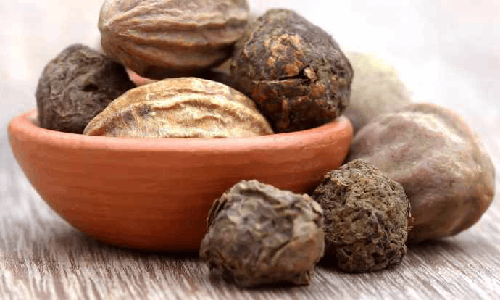Triphala is a combination of three fruits or herbs known as Haritaki, Bibhitaki, and Amalaki. Ayurveda refers to it as Tridoshic Rasayana – a medicine that is used to harmonize the Kapha, Vata and Pitta Doshas. There are many uses of Triphala, owing to the large number of benefits it offers! Benefits of Triphala Triphala has a lot of antioxidants like vitamin C that can help you stay healthy. Consuming Triphala supplements on an empty stomach before bedtime is beneficial as it assists in cleansing your internal system. It is one of the most widely used Ayurvedic medicines in the world. It is available over the counter, which means you don’t need to see a doctor or get a prescription to have this medicine. Is Triphala good for everyday use ? Let’s discuss more about it. Throughout ancient times, Triphala has been utilized in traditional Ayurvedic medicine as a multipurpose remedy for conditions ranging from stomach aches to tooth caries. Additionally, it is thought to enhance general health and longevity. It is classified as a polyherbal remedy since it contains a variety of therapeutic plants. Ayurvedic medicine, a traditional approach emphasizing health promotion and disease prevention, extensively uses polyherbal preparations. Synergistic herb combinations are thought to have more therapeutic efficacy and be a more potent treatment than any one herb used alone. Triphala is the most marketed, most prescribed (a default item in Ayurvedic prescriptions), and often advised to take every day! Is Triphala suitable for everyday use? Yes, it works excellent externally – as a face wash, as a hair wash, as an eye wash, and even as a vaginal wash! Triphala is better used internally rather than externally. But is it suitable for internal use every day? No. Continuous use of Triphala leads to – Loosening of tissues and muscles of the large intestine. – habit forming. Once you start, you won’t be able to pass bowel movements without it. – Drying up of the mucosal layer lining the large intestine. What is the best alternative for Triphala? If you have taken my course or my 3-month gut health program, you already know how much I love GH oil to control Vata that causes constipation. If you cannot get it, just take 2-3 ml of plain castor oil before bed. Follow up with hot water or mix with hot water. The opposite of dryness is oiliness. Using oil for constipation is far better than using any dry powders, be it Triphala, Nityam, Kayam churna, isabgol, or psyllium husk – all of which may satisfy you momentarily due to the fibre in it, but later, it leaves your tract drier so that you will need to take the same the next day to pass bowels. Triphala is a medicine. If you choose to take it internally, you must take it with the right vehicle (milk, warm water, cold water, etc. based on condition), in the right season, and the correct quantity under a doctor’s supervision. Otherwise, don’t bother at all! Unfortunately, manufacturers currently do not make commercially manufactured Triphala as per the proportions mentioned in the Samhitas to reduce cost. Four unique uses of Triphala There are four uses of Triphala. Triphala as a hair wash for dry, itchy scalp and dandruff Triphala is a natural remedy in Ayurveda that helps balance the Doshas in the body. It also helps keep our insides healthy, which then makes our hair and scalp healthy on the outside. Triphala powder is beneficial for hair health as it helps to combat fungus and bacteria. It works against germs, prevents your head from itching, and reduces flaking. Triphala can also alleviate inflammation on your scalp triggered by the use of inappropriate hair products or environmental shifts. It also helps hair to grow by making follicles and roots stronger. Amla found in Triphala aids in maintaining the natural pH balance of the scalp and promotes healthy hair. Triphala hair tonics can also help with dandruff and other skin issues. Weak and moisture-deficient, curly, and brittle hair is prone to breakage. Triphala assists in maintaining hair hydration and guarding against harm. This will leave your hair feeling soft, glossy and in excellent condition. Triphala as a face wash for acne-prone skin According to Ayurveda, the aggravation of Kapha leads to increased sebum production and clogging of pores. This results in the formation of both white and blackheads. An aggravation of Pitta, causes red papules (bumps) and inflammation with pus. When it comes to treating acne and blemishes, there are various approaches that individuals can take. One natural remedy that has gained attention for its potential benefits is Triphala. Inflammation is one of the key factors contributing to acne is inflammation. Triphala contains potent anti-inflammatory properties; therefore, it may help reduce redness and swelling associated with acne breakouts. By calming the skin and reducing inflammation, Triphala can provide relief from the discomfort often experienced with acne. Additionally, Triphala possesses antibacterial properties that may aid in fighting the bacteria responsible for causing acne. This can help prevent new blemishes from forming and promote clearer skin over time. While individual results may vary, incorporating Triphala into a skincare routine alongside other recommended treatments may offer a holistic approach to managing acne and blemishes. Triphala gives good results in case of skin problems like acne or pimples. Its usage helps to reduce acne or pimples because of its Pitta-Kapha balancing properties. Triphala as a vaginal douche Pruritus vulvae is the medical term for itching in the vagina. The term “pruritus vulvae” refers to itchiness in the vicinity of the vagina. The vulva refers to the external skin surrounding the vaginal opening. Persistent itching characterizes pruritus vulvae, which can cause emotional distress. The itching may worsen in the evening and could lead to difficulty falling asleep. Approximately… Continue reading Uses of Triphala in Ayurveda
Uses of Triphala in Ayurveda
